 My book, Lincoln: The Man Who Saved America, has been reviewed in Civil War Times magazine. Civil War Times is the “go-to” magazine for Civil War enthusiasts, and with a circulation of over 100,000, it’s the Number 1 magazine in its category. They also have a wide-ranging online presence. I’m a long-time subscriber myself. Each issue has maybe four books reviewed, so getting a review is a big deal.
My book, Lincoln: The Man Who Saved America, has been reviewed in Civil War Times magazine. Civil War Times is the “go-to” magazine for Civil War enthusiasts, and with a circulation of over 100,000, it’s the Number 1 magazine in its category. They also have a wide-ranging online presence. I’m a long-time subscriber myself. Each issue has maybe four books reviewed, so getting a review is a big deal.
Which is why I was happy to see in the August 2018 issue a review of Lincoln: The Man Who Saved America by one of the nation’s preeminent Lincoln scholars, Jonathan W. White, author of several books on Abraham Lincoln and the Civil War (several of which are on my shelf).
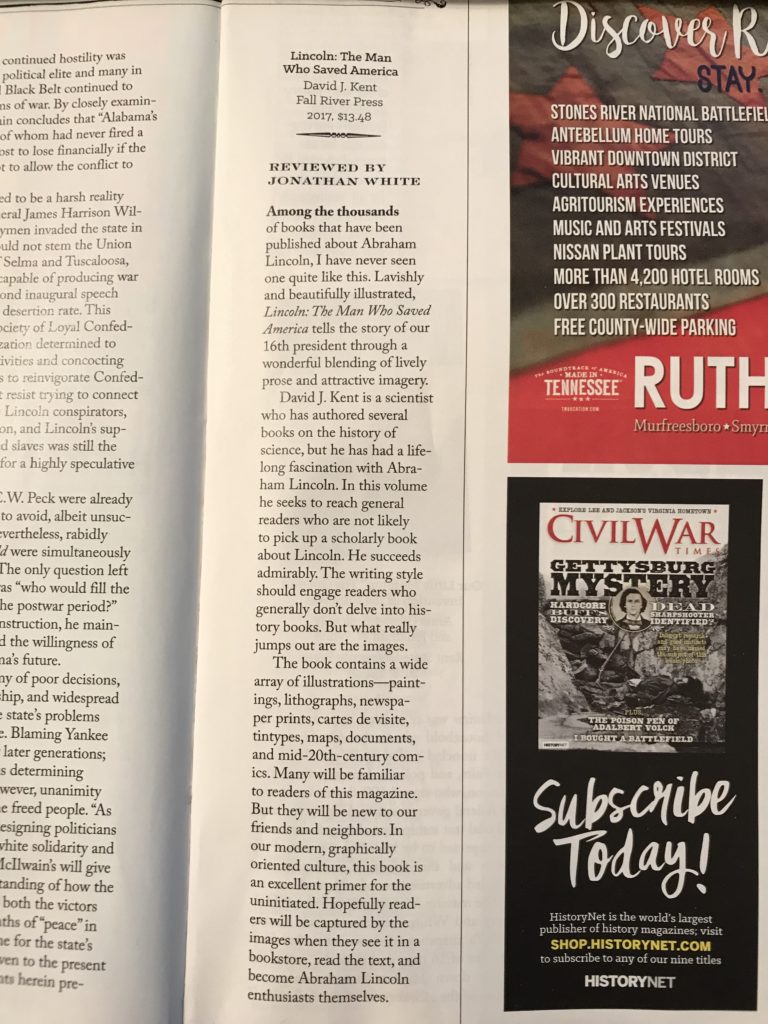 Admittedly, the review is a little hard to find, as I discussed in this article. You can pick up a copy at newsstands or check it out at your local library, then go straight to Page 69.
Admittedly, the review is a little hard to find, as I discussed in this article. You can pick up a copy at newsstands or check it out at your local library, then go straight to Page 69.
As you can see, the review is quite positive. White notes that the book “succeeds admirably” in reaching out to a broader audience, which was the goal of the book. He highlights the graphics (“paintings, lithographs, newspaper prints, cartes de visite, tintypes, maps, documents, and mid-20th-century comics”) and says that the writing style “should engage readers.”
The book has enjoyed great success and the second printing is already in Barnes and Noble stores nationwide. My earlier books on Tesla and Edison have been translated into several foreign languages so I’m expecting the same shortly for Lincoln.
This isn’t the only honor Lincoln: The Man Who Saved America has received. Late last year it was nominated for the Abraham Lincoln Institute book award (losing out to famed Lincoln scholar Richard Carwardine), and recently was nominated for the 2018 Lincoln Group of New York’s Achievement Award. It was also the overwhelming choice as the first book to be reviewed on the Railsplitter Podcast program (three episodes) and recently was selected as resource material for the LEAD: Spirit of Lincoln Youth Leadership Academy program in Springfield, Illinois.
You could say I’m very happy with the reception the book has received from the general public and Lincoln scholars alike.
David J. Kent is the author of Lincoln: The Man Who Saved America, in Barnes and Noble stores now. His previous books include Tesla: The Wizard of Electricity (2013) and Edison: The Inventor of the Modern World (2016) and two e-books: Nikola Tesla: Renewable Energy Ahead of Its Time and Abraham Lincoln and Nikola Tesla: Connected by Fate.
Check out my Goodreads author page. While you’re at it, “Like” my Facebook author page for more updates!






















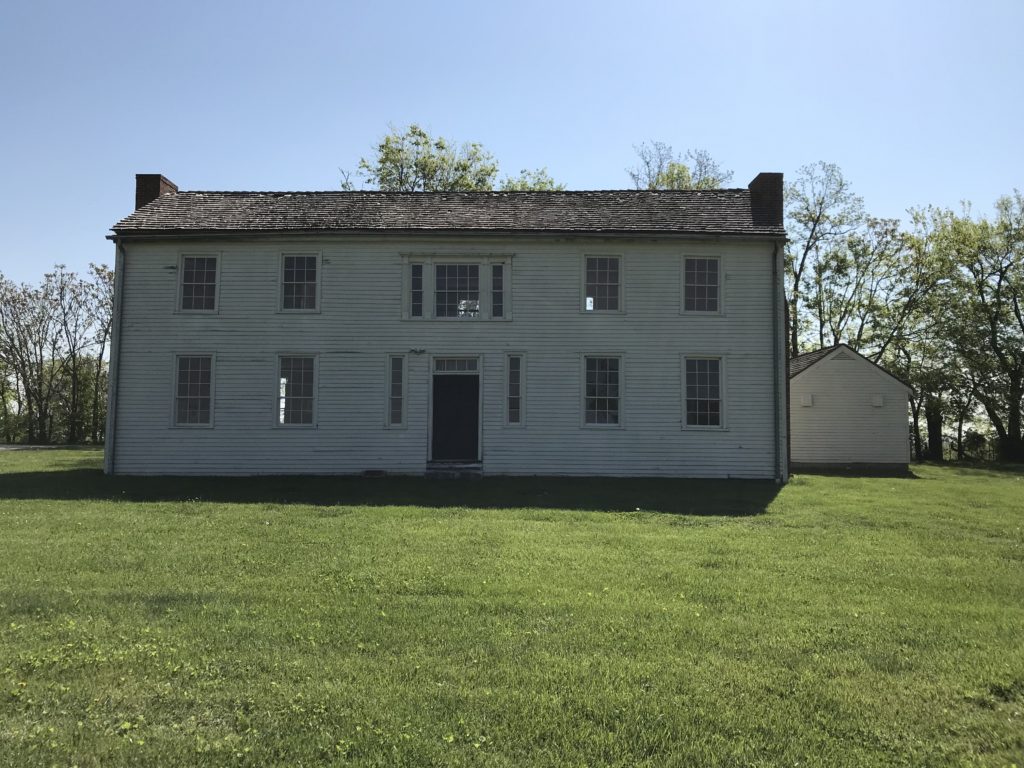
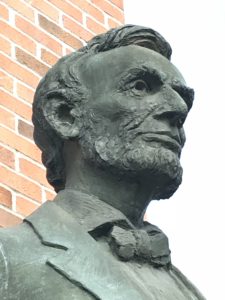 Everyone knows about the Abraham Lincoln Presidential Library and Museum in Springfield, Illinois, but there is another Abraham Lincoln Library and Museum. This one is in Harrogate, Tennessee in the campus of Lincoln Memorial University. And I spent the day there. It was an incredible experience.
Everyone knows about the Abraham Lincoln Presidential Library and Museum in Springfield, Illinois, but there is another Abraham Lincoln Library and Museum. This one is in Harrogate, Tennessee in the campus of Lincoln Memorial University. And I spent the day there. It was an incredible experience.








 In mid
In mid 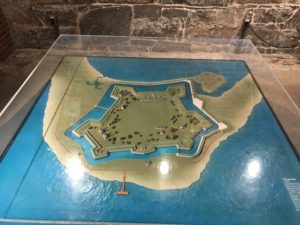 Named after our nation’s fifth president, Fort Monroe is, or at least was, one of the premier defenses of the Chesapeake Bay and Hampton Roads. Not far from here was the famous Battle of the Ironclads. On a recent visit I was able to tour the Fort Monroe National Monument, and in particular, the
Named after our nation’s fifth president, Fort Monroe is, or at least was, one of the premier defenses of the Chesapeake Bay and Hampton Roads. Not far from here was the famous Battle of the Ironclads. On a recent visit I was able to tour the Fort Monroe National Monument, and in particular, the 







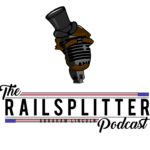 The
The 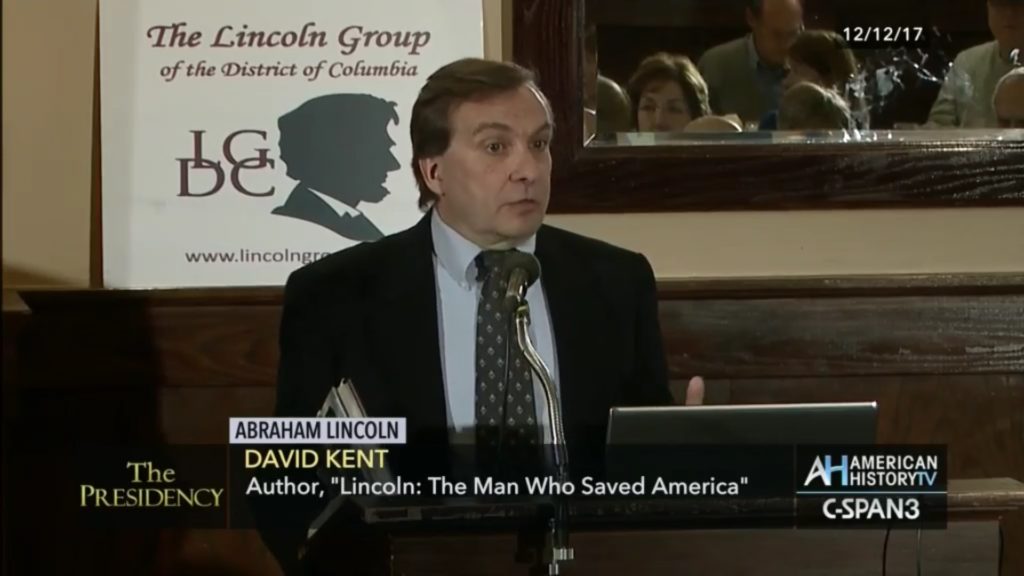
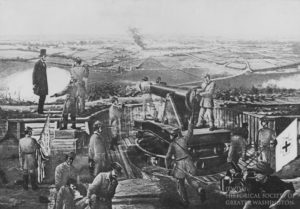 In the summer of 1864 Lincoln was becoming increasingly desperate to finish the war. He authorized Grant to engage in destructive warfare, targeting and destroying plantations, railroads, bridges, crops, and anything that the Confederacy needed to sustain its troops. In the latter part of 1864, General Philip Sheridan burned fields and plantations in Virginia’s Shenandoah Valley, while Sherman did the same in his March to the Sea through Georgia. Union forces left no possibility that Confederate forces could resupply soldiers along the way.
In the summer of 1864 Lincoln was becoming increasingly desperate to finish the war. He authorized Grant to engage in destructive warfare, targeting and destroying plantations, railroads, bridges, crops, and anything that the Confederacy needed to sustain its troops. In the latter part of 1864, General Philip Sheridan burned fields and plantations in Virginia’s Shenandoah Valley, while Sherman did the same in his March to the Sea through Georgia. Union forces left no possibility that Confederate forces could resupply soldiers along the way.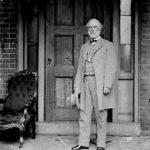 Meanwhile, Lincoln was coming under fire, literally. Robert E. Lee sent Confederate General Jubal Early to race up the Shenandoah Valley, invade Maryland,
Meanwhile, Lincoln was coming under fire, literally. Robert E. Lee sent Confederate General Jubal Early to race up the Shenandoah Valley, invade Maryland, 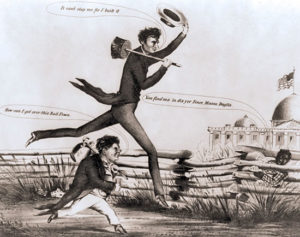 I’ll soon be off chasing Abraham Lincoln. Lincoln is everywhere it seems – Cuba, Norway, Scotland, the UK – but he spent most of his life in Kentucky, Indiana, and Illinois. And that’s where I’m going on my Chasing Abraham Lincoln Tour of 2018.
I’ll soon be off chasing Abraham Lincoln. Lincoln is everywhere it seems – Cuba, Norway, Scotland, the UK – but he spent most of his life in Kentucky, Indiana, and Illinois. And that’s where I’m going on my Chasing Abraham Lincoln Tour of 2018.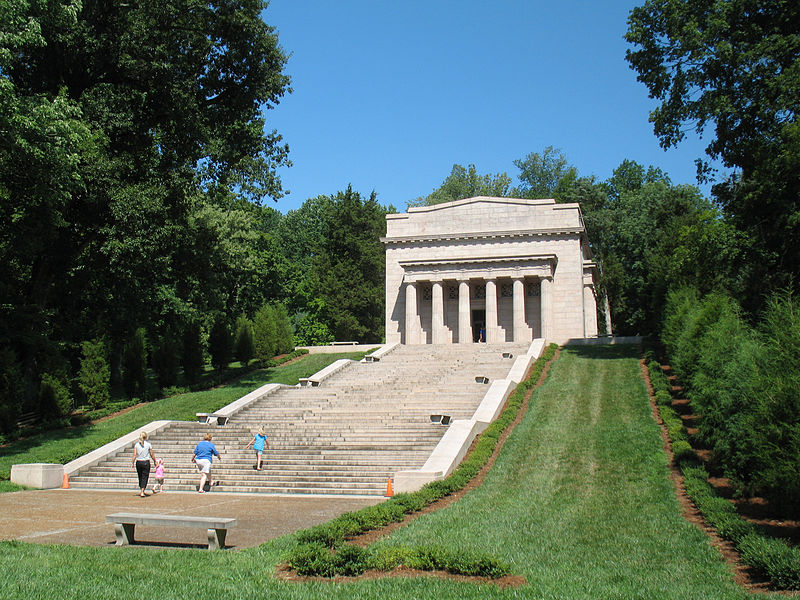
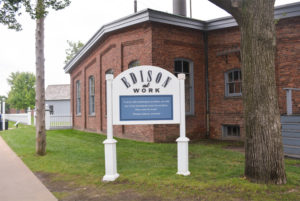
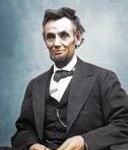 The Abraham Lincoln Institute holds an annual symposium, the last several years of which were held in historic Ford’s Theatre in Washington, D.C. Standing on-stage under the theatre box where Lincoln was assassinated creates a wave of emotions, from intimidating, to sadness, to inspiration.
The Abraham Lincoln Institute holds an annual symposium, the last several years of which were held in historic Ford’s Theatre in Washington, D.C. Standing on-stage under the theatre box where Lincoln was assassinated creates a wave of emotions, from intimidating, to sadness, to inspiration.






